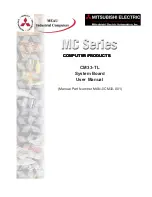
- 41 -
PCI IDE IRQ Map to
This items allows you to configure your system to the type of IDE disk controller in use.
By default, Setup assumes that your controller is an ISA device rather than a PCI control-
ler.
If you have equipped your system with a PCI controller, changing this allows you to
specify which slot has the controller and which PCI interrupt (A, B, C or D) is associated
with the connected hard drives.
Remember that this setting refers to the hard disk drive itself, rather than individual
partitions. Since each IDE controller supports two separate hard disk drives, you can
select the INT# for each. Again, you will note that the primary has a lower interrupt than
the secondary as described in "
Slot x Using INT#
" above.
Selecting "
PCI Auto
" allows the system to automatically determine how your IDE disk
system is configured.
Assign IRQ for USB
This item allows the user to assign IRQ to on-board USB controller or not.
Since on-board controller is enabled always, if none of IRQ is assigned to it, there will be
a question mark report on system device under windows 95.
PCI Latency Timer
The number of clocks programed in the PCI Latency Timer represents the guaranteed
time slice alloted to the 440BX, after which it must complete the current data transfer
phase and surrender the bus as soon as its bus grant is removed.
The PCI Latency Timer is used to guarantee to the PCI agents a minimum amount of the
system resource.
The default setting is 64 PCI clocks.
MS IRQ Routing Table
This item allows the user to set BIOS IRQ Routing Table Enabled or Disabled.
Used MEM base addr
This item is used to select a base address for the memory area used by any peripheral that
requires high memory.
The choices are
C800, CC00, D000, D400, D800, DC00
and
N/A.
Used MEM Length
This item is used to select a length for the memory area specified in the previous field.
this field does not appear if no base address is specified.
The choices are
8K, 16K, 32K
and
64K
.





































